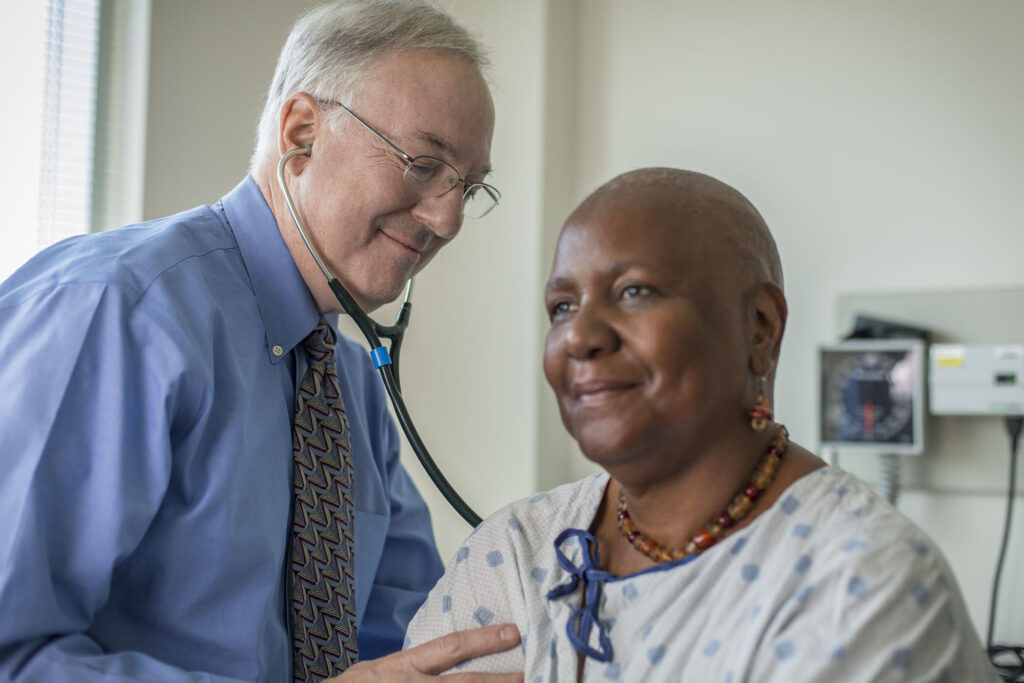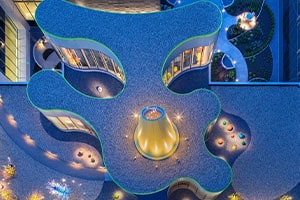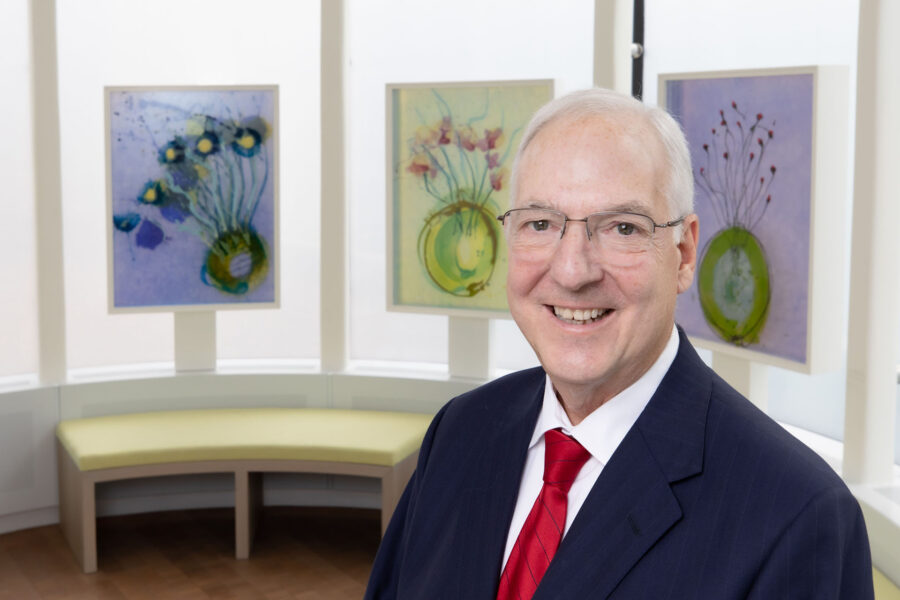Ken Cowan, MD, PhD, and the Fred & Pamela Buffett Cancer Center recently were featured as part of the University of Nebraska System’s NU for NE campaign, which shares stories of outstanding faculty, staff and student work across the campuses.
Cancer is the second leading cause of death in Nebraska. One in every three Nebraskans will hear the words “you have cancer” in their lifetime. It touches men, women and children across the state — in rural, urban and suburban areas. Ken Cowan, MD, PhD, is director and physician-in-chief at UNMC’s Fred & Pamela Buffett Cancer Center, which is improving cancer research and treatment for all.
The Fred & Pamela Buffett Cancer Center has more than 250 faculty members working in more than 100 laboratories at UNMC and hundreds of post-doctoral research fellows, lab technicians and PhD students— all with the goal of creating better health outcomes for cancer patients.
Dr. Cowan himself has a pedigreed background; he has been on a professional journey that underscores his success here in Nebraska. After receiving his MD and PhD in pharmacology, he completed his residency in internal medicine and decided to sub-specialize in oncology. He finished his oncology fellowship at the National Cancer Institute in Bethesda, Maryland, and then stayed on as a faculty member and investigator in the intramural program.
Cancer is the second leading cause of death in Nebraska. One in every three Nebraskans will hear the words “you have cancer” in their lifetime.
He remained there for 21 years, running the National Cancer Institute’s clinical research program focused on breast cancer.
“We’d see patients and put them on clinical trials,” Dr. Cowan said. “We had an opportunity to really develop a broad perspective on research — both laboratory research and clinical trials for breast cancer.”
But he always knew he would explore a leadership position at a cancer center at a hospital in a university system. When the job to lead UNMC’s Eppley Cancer Center opened up in 1999, Dr. Cowan answered the call.
The journey to create a world-class cancer center in Nebraska
When Dr. Cowan and his wife, Alison Freifeld, MD, moved to Omaha, they began making an impact right away. Dr. Freifeld, who is nationally recognized in the area of infectious disease and cancer, started and built a cancer oncology infectious disease program at UNMC. Since then, she has implemented and led several programs focused on managing infections in cancer and organ transplant patients.
Dr. Cowan started on the journey of expanding the Eppley Cancer Center’s clinical research programs. As it expanded significantly over the first 10 years, he realized that UNMC needed a new cancer facility to consolidate what they had and also to provide room for growth — both in their clinical programs and research programs.

He proposed the idea of a new cancer center to then-chancellor Harold M. Maurer, MD, who saw the need and agreed. So, with the help of philanthropists and the Nebraska Legislature, they raised $323 million for a new facility—the largest public-private partnership in University of Nebraska history. This included a lead gift from Pamela Buffett in honor of her husband, Fred Buffett, who died of kidney cancer. The opportunity to help cancer patients now had been expanded tremendously.
Back in his National Cancer Institute days, Dr. Cowan worked in the largest building on the National Institute of Health campus, Building 10, where the NIH hospital was housed. There were two floors dedicated to cancer, and the 12-story hospital, clinic and cancer laboratories were next door to the inpatient floor in the cancer clinic.
“It was one of the oldest buildings on the campus. But it was such a wonderful experience that even when newer buildings were built, nobody wanted to move their labs out of the old building. Because even if you’re a full-time researcher going to the lab, there was something special about going to work and coming up in the elevators every day and seeing patients or patients’ families or meeting them down in the cafeteria. It put a clear emphasis on why you were there and gave you a more meaningful experience every day.”
“Everybody in this building is focused on taking care of cancer patients.”
— Ken Cowan, MD, PhD
This memory was central to the new Fred & Pamela Buffett Cancer Center, where a cancer hospital and a cancer research tower were built together and all the offices put side-by-side — so everybody could work together as a team.
“Now, they’re all in one place and the entire team — all the nurses, all the pharmacists, all the staff, even the environmental services — everybody in this building is focused on taking care of cancer patients,” Dr. Cowan said. “The quality, the safety, the benefits, the outcomes are so much better. And the feedback from patients has been outstanding.”
What makes the Fred & Pamela Buffett Cancer Center unique
Research is a huge focus at the Fred & Pamela Buffett Cancer Center. The Suzanne and Walter Scott Cancer Research Tower is 10 stories high and includes 98 research labs. Unique in its design, the cancer center is the most fully-integrated cancer center in the world, putting clinical providers in close proximity with their research colleagues — with the goal of more efficiently translating research to patient care.
Dr. Cowan is known for being a highly empathetic physician. His parents both had cancer, and they both passed away while he was completing his oncology residency at the National Cancer Institute. He often gives his personal cell phone number and email address to patients, who describe him as approachable and caring. This is part of what drives his desire for proximity between researchers and patients and his focus on collaboration.
“You make one appointment and see everybody you need to see on your first visit—not only your surgeon, your medical oncologist and a radiation oncologist, but you can see a genetic counselor, physical therapists, a dietitian—all on the same day.”
— Ken Cowan, MD, PhD
Collaboration and integration is what makes the Fred & Pamela Buffett Cancer Center so unique.
“It’s one-stop shopping. You make one appointment and see everybody you need to see on your first visit — not only your surgeon, your medical oncologist, your radiation oncologist, but you can see a genetic counselor, physical therapists, a dietitian, all on the same day,” Dr. Cowan said.
“The entire team gets together and decides on a treatment plan for that particular patient. And we see them together on their first visit, in one day. They know exactly what we have planned for them and why.
“They no longer have to go to three different buildings, three different appointments, maybe over two weeks, like they might at other places. It’s one large multidisciplinary center, and they get to see everybody.”
A focus on the healing arts
The Fred & Pamela Buffett Cancer Center doesn’t just focus on curing disease — it also works to heal the human spirit by creating an atmosphere of hope and resilience. The Healing Arts Program creates environments that support and comfort people through diverse art opportunities and experiences.
“A lot of hospitals are built, and then art is added to them. We designed the hospital and decided the Chihuly glass sanctuary would be the centerpiece of the Healing Arts Program, and built around that.”
— Ken Cowan, MD, PhD
Experiences include therapeutic art and music programs for patients, a diverse art collection throughout the cancer center, rotating art exhibits, the “Search“ glass tower by Omaha artist Jun Kaneko, Leslie’s Healing Garden and the Chihuly Sanctuary by Dale Chihuly.

Studies have shown that art can lead to reduced pain perception, anxiety, stress, loneliness and depression. It can positively improve fatigue levels and offer patients and caregivers a safe space. Art has been incorporated into many hospitals — and many other cancer centers. The difference in this cancer center is that it is intentionally centered around the healing arts.
“A lot of hospitals are built, and then art is added to them. We designed the hospital and decided the Chihuly glass sanctuary would be the centerpiece of the healing arts program and built around that,” Dr. Cowan said.
“The rooftop is lit up at night and everybody from the hospital and the research center can look down it and see this beautiful glass artwork,” Dr. Cowan said. “It helps create hope for our patients and relieve stress for our staff.”
Impacting Nebraska and its economy
The Fred & Pamela Buffett Cancer Center not only impacts the health of patients across the state and the region, it also impacts Nebraska’s economy. A recent study shows that the cancer center makes a $629 million impact on the state of Nebraska each year — from research to clinical and operational dollars.
And not only is the cancer center a significant economic contributor to the state, it also is a social contributor. Its mission of providing educational programs, innovative research and outreach to underserved and rural populations makes a difference even to cancer patients who are not treated there.
A recent study shows that the cancer center makes a $629 million impact on the state of Nebraska each year — from research to clinical and operational dollars.
“The state should be really proud of what we have here,” Dr. Cowan said. “This is the destination cancer center for everybody — either to be treated here if they have the opportunity or to come for a second opinion and then get treatment closer to home. We provide world-class care for patients in an environment that’s truly amazing.”

The Buffett Cancer Center is inspirational. Truly bringing vision and hope to life.
Bravo! Well done Dr. Cowan! You are truly a “good & faithful” servant in our community. We have all benefitted from your contributions in more ways than you can imagine. The world is a much better place when we use our gifts to help others. You are a such a great example to follow.
Thank you!
Dr. Cowan will go down in history as one of UNMC’s all-time greats! The Buffett Cancer Center will be his enduring legacy. What a man!
Dr. Cowan saved my life. He is so caring, compassionate, and culturally competent. When I interact with other breast cancer patients and survivors outside of the FPBCC, I realize how fortunate we are to have these resources available in the Omaha community.